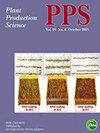Promotion of potato yield under moderate water deficiency at the seedling stage by modifying sink-source relationship
IF 1.3
3区 农林科学
Q2 AGRONOMY
引用次数: 3
Abstract
ABSTRACT Water deficiency is the main bottleneck in potato production in many regions worldwide. The generation of higher tuber yields per unit of water is a key goal for both agronomists and potato growers. In this study, we found that under moderate deficit irrigation (DI; 50% relative water content (RWC)) at the seedling stage of potato growth, the leaf area index (LAI) and dry matter accumulation were lower than control; however, they caught up with and surpassed the control at later developmental stages with a normal water supply, and a higher yield was ultimately achieved. The LAI and total dry weight under severe water stress (35% RWC) also surpassed the control at harvest; however, the final yield remained low, due to the low distribution of dry matter into the tubers. Abscisic acid (ABA) increased under DI conditions at the seedling stage, while gibberellin (GA1 and GA3) levels decreased. Moreover, endogenous ABA increased as plant development proceeded from seedling stage to tuber initiation stage, regardless of water stress. Exogenous ABA application promoted dry matter accumulation and distribution into the tubers. Therefore, it may be that ABA, as a major signaling molecule, mediates water stress to regulate tuber sink capacity at early development period. Through a feedback regulation stronger source capacity was stimulated by sink enhancement mediated by moderate water stress at the seedling stage, reached a higher tuber yield finally by reestablishment of sink-source relationship. Graphical abstract改良库源关系提高马铃薯苗期中度缺水产量
缺水是全球许多地区马铃薯生产的主要瓶颈。提高单位水量的块茎产量是农学家和马铃薯种植者的一个关键目标。本研究发现,在适度亏缺灌溉(DI;马铃薯苗期相对含水量(RWC)为50%时,叶面积指数(LAI)和干物质积累量均低于对照;然而,在正常供水的发育后期,它们赶上并超过了对照,最终实现了更高的产量。重度水分胁迫(35% RWC)下的LAI和总干重在收获时也超过对照;然而,由于干物质在块茎中的分配很少,最终产量仍然很低。赤霉素(GA1)和赤霉素(GA3)含量降低,脱落酸(ABA)含量增加。此外,无论水分胁迫如何,内源ABA随着植物从苗期到块茎形成期的发育而增加。外源ABA的施用促进了干物质在块茎中的积累和分配。因此,ABA可能作为一种主要的信号分子,介导水分胁迫,调控块茎发育早期的汇容量。苗期适度的水分胁迫介导的汇增强,通过反馈调节,激发更强的源容量,最终通过库源关系的重建达到更高的块茎产量。图形抽象
本文章由计算机程序翻译,如有差异,请以英文原文为准。
求助全文
约1分钟内获得全文
求助全文
来源期刊

Plant Production Science
农林科学-农艺学
CiteScore
5.10
自引率
4.00%
发文量
27
审稿时长
>36 weeks
期刊介绍:
Plant Production Science publishes original research reports on field crops and resource plants, their production and related subjects, covering a wide range of sciences; physiology, biotechnology, morphology, ecology, cropping system, production technology and post harvest management. Studies on plant production with special attention to resource management and the environment are also welcome. Field surveys on cropping or farming system are also accepted. Articles with a background in other research areas such as soil science, meteorology, biometry, product process and plant protection will be accepted as long as they are significantly related to plant production.
 求助内容:
求助内容: 应助结果提醒方式:
应助结果提醒方式:


